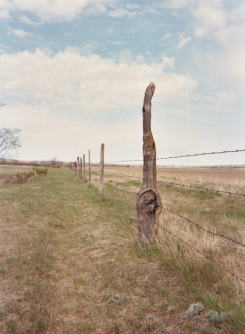|
As a grad student, translating Parmenides’ poem from the classical Greek opened a floodgate of remembering my life on the prairie. That remembered prairie life became a vehicle for traveling into the language through which Parmenides’ poem evokes a journey into thought on the nature of Being and Becoming. Remembered fenceposts and my standing next to them exploring their weathered sides and imagining what they had seen and heard standing there at one spot all that time became metaphors that pointed toward the stillness I began to glimpse in the well-placed words of Parmenides. I’d sit for a long time next to a phrase of the Greek, waiting to hear it in its own terms, hoping to move nearer to Parmenides’ choice of a word, a verb tense, or a metaphor that evoked a sense of the one and the still and that embodied these in words that do what they say. |
Someplace along the way of this translating journey, I began to imagine that standing next to a Greek phrase, waiting to catch its idiosyncratic lean toward its possible meaning was not so different from standing next to those fenceposts as a kid, feeling drawn toward their stillness, their ever-presence, signaled in the sound of wind fluttering through the splinters on a weathered side of an old ash or pine post. The solidity of weathered wood against the movement of wind, the earth below me feeling still even while spinning, all of it conveyed into my body an interweaving of movement and stillness toward which Parmenides’ poem pointed in sound and word as I came to hear it. It was in this standing next to Parmenides’ Greek phrases that I began to remember the longing I felt while standing next to the fenceposts, the longing for “what stands still a long time.” |

